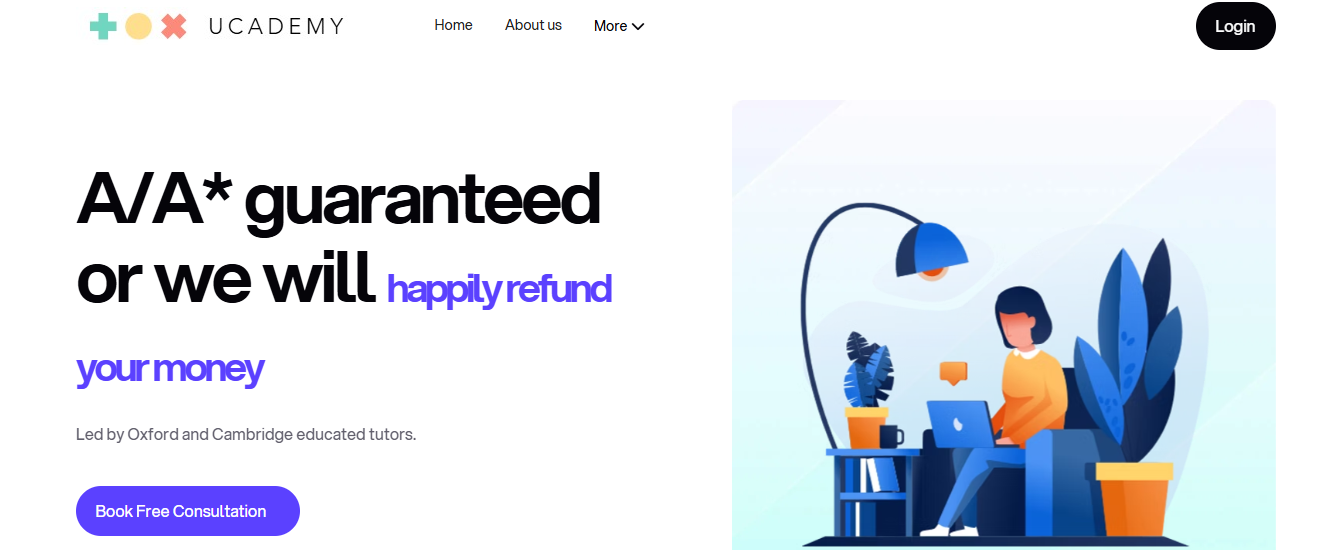Deciding whether to pursue the International Baccalaureate or A Levels can feel like being on a roller coaster: one moment you’re filled with excitement, the next, you’re terrified by the steep drop ahead. Comparing IB and A-Levels can be overwhelming. Both paths are rigorous and prepare students for university, but they do so in different ways. This guide will provide valuable insights to help you understand the similarities and differences between the IB and A Levels, enabling you to determine which path best suits your strengths and goals.
Ucademy’s online tutoring UK can also help you achieve your academic goals. By connecting you with a knowledgeable tutor, we can help you gain a clear, straightforward comparison of IB and A Levels to decide which path suits your strengths and goals best.
What are A-levels?

A-levels, short for Advanced Levels, are a well-established UK qualification taken by students aged 16 to 18. They follow GCSEs and are typically studied over two years in sixth form or college, covering Years 12 and 13. These qualifications focus mainly on academic subjects, allowing students to specialise in areas they enjoy or want to pursue further. Most students take three or four subjects, though the choice is flexible depending on the school or college’s offerings.
With over 50 subjects available, options range from traditional areas such as Mathematics, English Literature, and Biology to the arts, humanities, and social sciences. However, schools typically offer a smaller selection, tailored to their resources and demand. A-levels are internationally recognised and form a key part of university admission criteria, especially in the UK. They provide depth of knowledge and prepare students for higher education or professional paths.
Introduced over seven decades ago, A-levels remain a respected route for academic progression. Their structure encourages independent study, critical thinking, and a detailed understanding of chosen subjects. Overall, A-levels are a crucial stepping stone in the UK education system, balancing broad learning opportunities with specialised study to equip students for future success.
What is IB?

The International Baccalaureate (IB) is a globally recognised educational programme founded in 1968. It was designed to offer a rigorous and broad-based curriculum that transcends national education systems. The most well-known part of the IB is the Diploma Programme (IBDP), which is usually completed by students aged 16 to 18. This two-year course is often compared to the A-levels in the UK, as both serve as qualifications for university entry.
The IBDP requires students to study six subject groups, covering languages, sciences, mathematics, humanities, and the arts. This ensures learners develop knowledge and skills across a diverse range of disciplines. Beyond academic subjects, the IB places strong emphasis on critical thinking and personal development. Students must complete the Theory of Knowledge (TOK) course, which encourages reflection on the nature and limits of knowledge.
Creativity, Activity, Service (CAS) is another core element that nurtures students' engagement with their communities and promotes a balanced lifestyle. This component fosters creativity, physical activity, and voluntary service. Another key feature is the Extended Essay, an independent research project that helps students develop in-depth investigative skills and academic writing.
In the UK, the IB remains less widespread than traditional qualifications, such as A-levels. Currently, fewer than one hundred schools offer the IB, with around 5,000 students taking the diploma each year. Globally, the IB is offered in thousands of schools and is recognised by universities around the world for its academic rigour and holistic approach. It appeals primarily to international students or those seeking a challenging curriculum with a global perspective.
Related Reading
- A Levels vs GCSE
- A Levels Needed for Engineering
- What to do If You Fail A Levels
- A Level Grading System
How are A-levels and IB Assessed?

A-level Assessment
A-levels are typically completed over two years, such as the AS year (Year 12) followed by the A2 year (Year 13). They are often described as "linear" qualifications, meaning that the final grades are decided solely by the exams taken at the end of Year 13. During the first year, students sit exams in all of their chosen subjects. For those pursuing the full A-level, these initial exams do not count towards the final grade, but they may influence the predicted grades.
However, if a student is studying the subject only at AS level, the Year 12 exams determine their final AS-level grade. It’s important to note that in Wales and Northern Ireland, AS-level results can still contribute 40% towards the overall A-level grade. A-level subjects are graded from A* (the highest) down to E (the minimum pass grade). When applying to university, offers are usually conditional, requiring students to achieve specific A-level grades, for example, AAB.
IB Assessment
The International Baccalaureate (IB) Diploma has a more intricate assessment structure. Students take six subjects, selecting at least three at Higher Level (HL) and the remaining at Standard Level (SL).
Alongside these subjects, students complete several core components: a Theory of Knowledge (TOK) essay and presentation, an Extended Essay (EE) on a topic of their choice, and 150 hours of Creativity, Activity and Service (CAS) involving extracurricular or community activities.
The six subject groups in the IB are:
- Studies in Language and Literature
- Language Acquisition
- Individuals and Societies (humanities and social sciences)
- Experimental Sciences
- Mathematics
- Arts
Students choose one subject from each of the first five groups. For the sixth subject, they may either select a topic from the Arts or pick a second from the other groups. Each subject is graded on a scale from 1 (lowest) to 7 (highest).
Additionally, students earn points based on their combined performance in Theory of Knowledge and the Extended Essay, which are scored on a scale of 1 to 3. Hence, the maximum overall IB score is 45 points.
A-levels vs IB?

Deciding between A-levels and the International Baccalaureate (IB) Diploma can be a challenging decision. Both offer distinct advantages, and understanding their differences is crucial to making an informed decision that aligns with your academic goals and interests.
A-levels
A-levels are designed for students who wish to focus intensely on a few subjects. Typically, learners select three or four subjects to study in depth over a two-year period. This concentrated approach allows students to develop strong expertise and a profound understanding of their chosen areas.
This pathway is particularly beneficial for those with a clear vision of their future career or university course. By specialising early, students can build a solid academic foundation aligned with specific degree requirements. A-level results are widely recognized by universities in the UK and abroad, often being preferred for courses that require detailed subject knowledge.
IB Diploma
The IB Diploma offers a broader educational experience, requiring students to take six subjects that span the humanities, sciences, languages, mathematics, and the arts. Beyond coursework, the programme includes core components such as Theory of Knowledge (TOK), the Extended Essay (EE), and Creativity, Activity, Service (CAS), which enhance critical thinking, research skills, and social awareness.
This structure encourages students to develop a well-rounded skill set, including interdisciplinary thinking and global perspectives. It is ideal for learners who enjoy balancing diverse subjects and seek a curriculum that promotes adaptability and comprehensive intellectual growth.
Which Should You Choose?
If you are sure about your academic and career direction and prefer specialising, A-levels offer a direct route into your field of interest. Conversely, if you value a balanced curriculum that cultivates a wide range of skills and interests, the IB Diploma might be more suitable. Ultimately, both A-levels and the IB are well-respected qualifications that can lead to successful university admission and beyond. The best choice depends on your individual preferences, learning style, and future aspirations.
If you are considering either academic path and want expert advice, Ucademy offers tailored support and resources to help you succeed in both A-levels and the IB. The team provides guidance, revision materials, and expert tutoring, ensuring that students are well-prepared regardless of the qualification they choose.
Book a Free Consultation Today | Free University Readiness Audit
Our proven British Curriculum methodology has helped thousands of students achieve top grades, with expert tutors from top universities, such as Oxford and Cambridge, guiding them every step of the way. Ucademy takes the confusion out of navigating GCSEs, A Levels, 11+, and university applications by creating a personalised roadmap explicitly tailored to your child's goals and learning style.
We provide a structured accountability framework that busy parents need, ensuring your child stays on track to reach their full academic potential and secure a place at a top university. Don't let your child struggle through critical academic years without expert guidance and a clear path to success. Book your free consultation today to get your free university readiness audit and action plan.
Pros and Cons of A-levels

A-levels remain one of the most popular pre-university qualifications, especially in the UK and many international schools. Here’s a balanced look at their advantages and disadvantages.
Pros of A-levels
1. In-Depth Subject Knowledge
A-level students typically focus on just three or four subjects, allowing them to explore each in greater detail. This focused approach enables a deeper understanding of their chosen fields compared to broader qualifications, such as the IB diploma.
2. Choice Based on Interest and Strength
Students have the freedom to pick subjects they enjoy and excel at. This not only boosts motivation and enjoyment but also enhances performance by allowing learners to focus on their strengths and avoid weaker areas.
3. Wide Accessibility
A-levels are widely available across the UK and many schools worldwide. Unlike other qualifications such as the IB, which can be limited to fewer institutions, A-levels are easy to find and enroll in wherever you live.
4. Preparation for University Independence
Since A-level courses often have fewer timetabled hours than some other qualifications, students must develop strong self-discipline and independent study skills. These abilities are invaluable for handling the greater autonomy expected at university.
Cons of A-levels
1. Early Specialisation
A-level students must decide their subject focus typically by age 16. This can be a challenge for those still uncertain about their future academic or career paths. However, selecting ‘facilitating’ subjects can keep many degree options open.
2. Exam-Centred Assessment
Many A-level subjects emphasize final exams as a primary means of determining grades. This format may not suit all learners, especially those who struggle under exam pressure. However, accommodations and special arrangements can often be requested to support students with specific needs.
Pros and Cons of IB

The International Baccalaureate (IB) is a globally recognised educational programme designed to provide students with a comprehensive learning experience. Yet, like any academic pathway, it has its strengths and weaknesses. Below is an overview of the key advantages and drawbacks of the IB, based on verified information.
Pros of the IB
1. A Broader and More Holistic Education
One of the primary benefits of the IB is its breadth of subjects, which provides students with a well-rounded education. Unlike some other curricula, it encourages learners to explore a diverse range of disciplines. Additionally, the Creativity, Activity and Service (CAS) component requires students to engage in at least 150 hours of extracurricular activities. This aspect ensures that learning is not confined to academic study, but also includes personal and social development, fostering skills that extend beyond the classroom environment.
2. Emphasis on Long-Term Understanding and Skills
The IB places less emphasis on rote memorization and more on comprehension and application. Students are encouraged to grasp how information is structured and theories are utilized, rather than merely recalling facts. This focus nurtures critical thinking, analysis, and the ability to apply knowledge in practical or novel contexts, skills that are valuable across higher education and beyond.
Cons of the IB
1. Favours Generalists over Specialists
While the broad curriculum is beneficial to many, it can disadvantage students who have outstanding talent or passion in just one or two subjects. Because universities' offers often consider the overall IB score rather than excellence in specific courses, exceptional performance in a few areas may not be adequately rewarded. This could affect access to specialised degree programmes, especially in highly competitive fields.
2. May Not Align Well with the British University Model
Critics argue that the IB does not entirely fit the British higher education system. Unlike countries such as the United States, where students begin with a broad curriculum and specialise later, UK universities typically expect applicants to have specialised knowledge upon entry. Hence, the IB’s broad approach might not perfectly prepare students for the immediate academic focus required in UK undergraduate studies.
3. Intensive Workload and Time Demands
The IB is well-known for its rigorous requirements, including multiple subjects, the Extended Essay, CAS hours, and internal assessments. This can lead to a heavy workload that some students find overwhelming, more so when compared to the traditional A-level system. Managing deadlines and balancing various demands requires strong organisational skills and perseverance.
Related Reading
- Is Maths A Level Hard
- Is History A Level Hard
- Is Geography A Level Hard
- How to Get an A in Level Chemistry
Which Qualification is Highly Regarded by Universities?

When considering pre-university qualifications, two main options often arise: A-levels and the International Baccalaureate (IB). Both are well-respected by universities, but their strengths and recognition can vary depending on the location and institution.
Strengths of A-levels and the IB
According to the University Officers Report 2017, the IB is praised for promoting a “global outlook” and fostering “independent inquiry” among students. This makes it particularly valued for its broad and balanced curriculum, as well as the development of critical thinking skills. On the other hand, A-levels are acknowledged for allowing students to gain “detailed and in-depth expertise” in a narrower range of subjects. This means A-levels are often preferred by students who want to specialise early in their areas of interest.
Recognition within UK Universities
In the UK, there is no clear-cut preference for the IB or A-levels by universities. Generally, A-levels remain the most common qualification as they are deeply embedded in the British education system. However, the UCAS tariff system recognises a wide array of pre-university qualifications, including the IB, enabling universities to consider both reasonably.
Prospective students are advised to carefully research the entry requirements of their chosen universities and courses. Some degree programmes may have a clear preference, or different grade requirements depending on whether a student holds A-levels or the IB. Often, universities provide statistical profiles that show the typical intake from each qualification route, which can help applicants make informed choices.
Studying Outside the UK
A-levels, while primarily a British qualification, are offered internationally through British schools in many Commonwealth and former Commonwealth countries. Thanks to its widespread reach, A-levels are recognised by universities globally, even in countries that do not have a British education system. The IB is also internationally recognised and, in many regions, serves as a standard qualification for university entry. Top universities in the United States, Europe, Australia, and Hong Kong often list the IB explicitly in their admissions criteria. This broad acceptance makes the IB a strong option for students aiming to study in diverse international contexts.
Both A-levels and the International Baccalaureate are highly regarded by universities worldwide. A-levels offer depth in specific subjects, particularly valued by UK institutions, while the IB is known for its breadth and development of global perspectives. Ultimately, the best choice depends on the student’s academic strengths, university aspirations, and the specific entry requirements of their preferred courses. Thorough research into individual institution policies remains essential for making a well-informed decision.
Let’s Talk About Ucademy’s Online Tutoring UK
Ucademy takes the confusion out of navigating GCSEs, A-levels, 11+, and university applications by creating a personalized roadmap explicitly tailored to your child's goals and learning style.
We provide the structured accountability framework that busy parents need, ensuring your child stays on track to reach their full academic potential and secure their place at a top university. Don't let your child struggle through critical academic years without expert guidance and a clear path to success. Book your free consultation today to get your free university readiness audit and action plan.
Factors to Consider When Choosing Between A-levels and IB

Academic Strengths and Subject Focus
When choosing between A-levels and the International Baccalaureate (IB), consider your academic strengths and preferences to determine which is the best fit for you. A-levels offer in-depth study of a smaller number of subjects, making them ideal for students who excel in specific areas. In contrast, the IB requires students to study a broader range of subjects, making it better suited for those who enjoy being well-rounded academically. Reflect on whether you prefer to specialise or embrace a wider curriculum.
Personal and Career Goals
Your future ambitions play a significant role in this decision. If your career path requires specialising in particular subjects, A-levels might be a better fit. Conversely, the IB’s emphasis on developing a global outlook and combining subjects across disciplines could benefit students aiming for diverse opportunities or international studies. Consider how each qualification aligns with your university goals and long-term objectives.
Workload and Assessment Structure
The workload and assessment style differ considerably between the two. A-levels generally focus on exams taken at the end of each course, though the amount of coursework varies by subject. Sciences are often exam-heavy, whereas humanities include more coursework. IB combines exams with continuous assessment components, such as the Extended Essay and the Creativity, Activity, Service (CAS) programme, resulting in a more balanced yet intensive workload. Consider your learning style and how you approach exams versus coursework spread over time.
Availability and School Provision
Availability may limit choices. Fewer schools offer the IB programme compared to A-levels, so verify if your school provides the IB if that option interests you. This practical consideration can significantly influence your decision.
Taking these factors into account will help you make a well-informed choice between A-levels and the IB, tailored to your academic profile, personal aspirations, and practical circumstances.
Related Reading
- How to Revise Psychology A Level
- How to Revise Physics A Level
- How to Revise A Level History
- How to Revise a Level Biology
- How Many A Levels Can You Take
Book a Free Consultation Today | Free University Readiness Audit

Our proven British Curriculum methodology has helped thousands of students achieve top grades, with expert tutors from top universities, such as Oxford and Cambridge, guiding them every step of the way. Ucademy takes the confusion out of navigating GCSEs, A Levels, 11+, and university applications by creating a personalised roadmap explicitly tailored to your child's goals and learning style.
We provide a structured accountability framework that busy parents need, ensuring your child stays on track to reach their full academic potential and secure a place at a top university. Don't let your child struggle through critical academic years without expert guidance and a clear path to success. Book your free consultation today to get your free university readiness audit and action plan.






